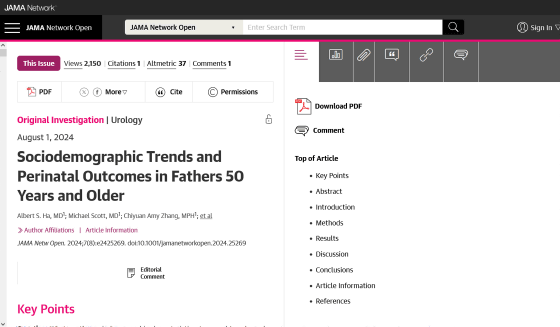Research reveals that the increase in 'older fathers' having children in their 50s poses risks to modern society

In recent years, there has been a growing trend for people to seek economic stability when starting a family, and coupled with the advancement of women in the workforce, the trend towards later marriage is accelerating. In this environment, the number of 'older fathers' over 50 years old when their children are born is on the rise, but new research has shown that this trend poses risks to the health of children.
Sociodemographic Trends and Perinatal Outcomes in Fathers 50 Years and Older | Urology | JAMA Network Open | JAMA Network

Fatherhood at Fifty Is a Growing Trend, With Impacts on Child Health : ScienceAlert
https://www.sciencealert.com/fatherhood-at-fifty-is-a-growing-trend-with-impacts-on-child-health
When parents discuss the age at which they should have children, the focus is inevitably on the mother carrying the fetus, but a 2018 study showed that fathers over 35 years of age have a higher risk of low birth weight and seizures, while fathers over 45 years of age have a 14% higher risk of premature birth.
A new research team led by Albert Herr, a urologist at the Stanford University School of Medicine, analyzed birth data from more than 46 million people born in the United States between 2011 and 2022 to examine trends in paternal age and its impact on children.
The analysis revealed that the average age of fathers was 30.8 years old in 2011, but will rise to 32.1 years old in 2022. In addition, the percentage of fathers aged 50 or older at the time of their children's birth will increase from 1.1% in 2011 to 1.3% in 2022.
The modern trend of older fathers may be due to men's declining concern about their biological age, as well as a desire for greater education and financial stability when starting a family. 'Recent socioeconomic and demographic trends have altered the family formation timeline in the United States, with many couples delaying parenting,' the researchers said.

The team also looked at the impact of older fathers on children's health, taking into account the mother's age and other factors.
The study found that for every 10 years of paternal age, the proportion of births that were dependent on assisted reproductive technology (ART) such as in vitro fertilization increased. It also found that older fathers were more likely to be mothers giving birth for the first time, and were at higher risk of premature birth and low birth weight.
'Paternal age influences fertility rates, pregnancy outcomes and the health of children,' the team wrote. 'Age-related conditions such as erectile dysfunction and
As sperm quality declines with age , men are more likely to pass on DNA fragmentation, chromosome abnormalities, new mutations, and changes in gene expression to their babies. The accumulation of these changes increases the risk of childhood autism, childhood cancer, achondroplasia , and schizophrenia, as well as reducing the chances of ART being successful.

There are concerns that the father's age may influence the gender of the baby, but this study found no significant differences apart from the fact that 'if the father is 70 years or older, the baby is more likely to be a girl.'
'This study highlights the need to raise awareness of the risks to older fathers and to further explore the factors driving this societal change,' Science Alert said.
Related Posts:
in Science, , Posted by log1h_ik







